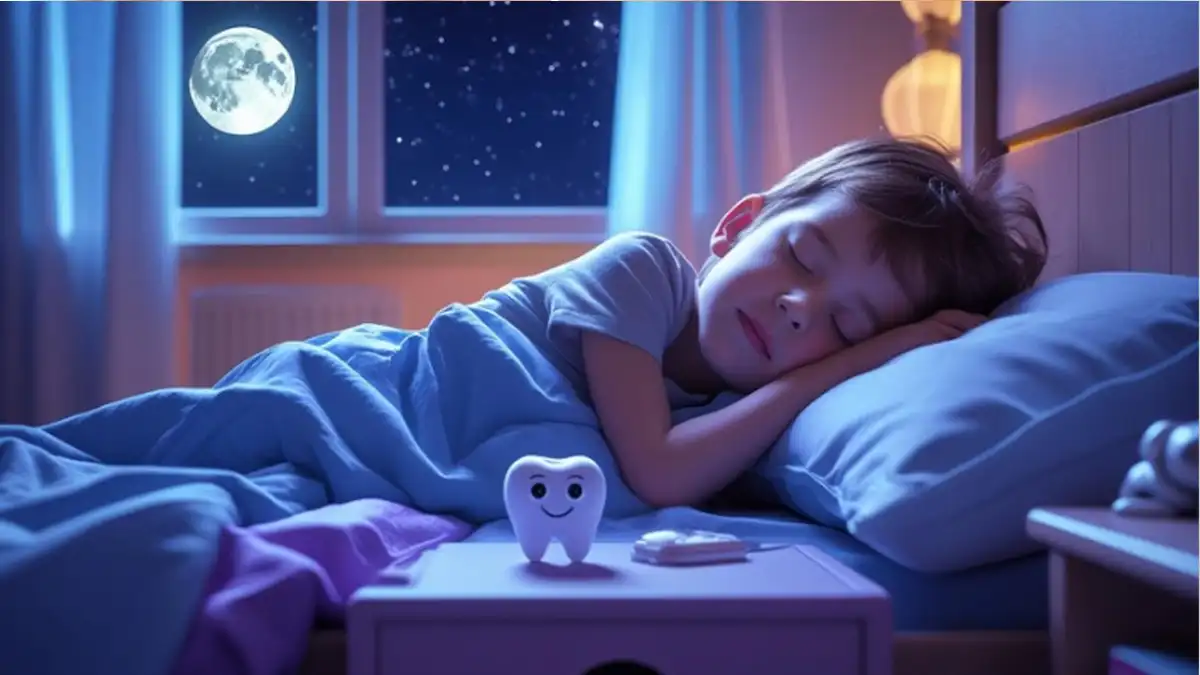If you’ve ever heard your child grinding their teeth at night, you’re not alone—and you’re probably wondering if it’s something to worry about. Tooth grinding in children, medically known as bruxism, is surprisingly common. Research suggests that 15-33% of children grind their teeth at some point during childhood, with peak occurrence between ages 5 and 7. While those nighttime grinding sounds can be unsettling for parents, the good news is that most cases of teeth grinding in kids are temporary and resolve on their own. Understanding when tooth grinding is a normal part of development versus when it requires dental intervention can help you make informed decisions about your child’s oral health.
What Is Tooth Grinding in Children?
Tooth grinding, or pediatric bruxism, occurs when a child unconsciously clenches their jaw or grinds their upper and lower teeth together. This typically happens during sleep, though some children also grind their teeth during the day. You might notice a grinding or clicking sound coming from your child’s room at night, or your child might wake up complaining of a sore jaw or headache.
There are two types of bruxism in children. Sleep bruxism is the most common form, occurring during sleep cycles, particularly during lighter sleep stages. Awake bruxism happens during waking hours and is often associated with concentration, stress, or habit. Most parents first notice tooth grinding in children when they hear it at night, making sleep bruxism the more commonly reported concern.
Signs Your Child Might Be Grinding Their Teeth
Not all children who grind their teeth make audible sounds. Watch for these additional indicators: worn, flattened, or chipped tooth surfaces; increased tooth sensitivity, especially to hot or cold; complaints of jaw pain or tiredness upon waking; frequent headaches, particularly in the temple area; or tight jaw muscles that you can feel when your child clenches.
Why Do Kids Grind Their Teeth?
Understanding the causes of tooth grinding in children can help you determine whether intervention is needed. Unlike adults, whose bruxism is often linked to stress or sleep disorders, pediatric bruxism has multiple developmental and physiological triggers.
Developmental Causes
One of the most common reasons for teeth grinding in young children is simply growth and development. As baby teeth erupt and later fall out, children’s bites are constantly changing. This misalignment is temporary, and many children grind their teeth as their jaw adjusts to these changes. Similarly, when permanent teeth begin coming in between ages 6 and 10, the changing landscape of the mouth can trigger grinding as the bite seeks its new normal.
Sleep-Related Factors
Sleep patterns play a significant role in pediatric bruxism. Children who experience disrupted sleep, sleep apnea, or other breathing issues during sleep are more likely to grind their teeth. According to sleep specialists, tooth grinding can be the body’s attempt to reopen airways that become partially blocked during sleep. This is why a holistic evaluation that considers sleep quality and airway function is so important when assessing grinding concerns.
Stress and Emotional Factors
While less common than developmental causes, stress and anxiety can contribute to tooth grinding in children. Major life changes like starting school, moving to a new home, family changes, or even excitement about upcoming events can manifest as nighttime grinding. If your child is going through a stressful period and has recently started grinding their teeth, the two may be connected.
Medical Conditions and Medications
Certain medical conditions can increase the likelihood of bruxism. Children with attention deficit hyperactivity disorder (ADHD), autism spectrum disorders, or cerebral palsy have higher rates of teeth grinding. Some medications, particularly certain stimulants used to treat ADHD, can also cause or worsen bruxism as a side effect.
When Tooth Grinding in Children Is Normal
Most cases of tooth grinding in young children are considered normal and don’t require treatment. If your child is between ages 3 and 7, has no other symptoms, and the grinding seems related to teething or tooth development, a watchful waiting approach is typically appropriate. The grinding is likely to decrease as permanent teeth come in and the bite stabilizes.
Occasional grinding, especially during times of minor stress or excitement, is also generally not concerning. If you notice your child grinds their teeth for a few nights when they’re particularly excited about an upcoming event or briefly stressed about a school project, this is usually temporary behavior that will resolve on its own.
According to the American Academy of Pediatric Dentistry, most children outgrow bruxism without intervention. The grinding typically decreases and eventually stops as children enter their teen years and their permanent teeth are fully established.
When to Seek Professional Help
While most tooth grinding in children resolves naturally, certain signs indicate it’s time to schedule an appointment with a pediatric dentist. You should seek professional evaluation if grinding is causing visible tooth damage like chips, cracks, or significant wear on tooth surfaces. Persistent pain or discomfort, including regular jaw pain, frequent headaches, or complaints of tooth sensitivity, also warrants a dental visit.
If grinding is accompanied by snoring, gasping, or mouth breathing during sleep, this could indicate a sleep-breathing disorder that requires evaluation. At Petite Smiles in Lorton, Dr. Heba Rashed and her team take a holistic approach that considers sleep, airway function, and overall development when evaluating tooth grinding concerns.
You should also consult a dentist if the grinding continues beyond age 7, increases in frequency or intensity, or is affecting your child’s quality of life by disrupting sleep or causing daily discomfort. For families in the Lorton, Newington, or Fort Belvoir area, we’re here to assess whether your child’s grinding requires intervention.
How Pediatric Dentists Diagnose and Treat Tooth Grinding
When you bring your child in for an evaluation of tooth grinding, expect a comprehensive assessment. Using state-of-the-art technology, pediatric dentists examine teeth for signs of wear patterns, check jaw alignment and bite relationships, assess jaw muscle tension and function, and review sleep habits and quality.
At our Lorton practice, we also consider whether airway or breathing issues might be contributing to the grinding. This holistic approach helps us determine not just if treatment is needed, but what type of treatment will be most effective for your child’s specific situation.
Treatment Options for Severe Cases
For most children with tooth grinding, no treatment is necessary beyond monitoring. However, when grinding is causing damage or pain, several treatment options are available. We offer custom night guards for severe grinders—these are specially fitted appliances that protect teeth from the damaging effects of grinding while your child sleeps. Unlike over-the-counter options, custom guards fit properly and are designed specifically for growing mouths.
If stress or anxiety appears to be a factor, stress reduction techniques and relaxation routines before bed can help. We can also address underlying issues like treating sleep-disordered breathing if airway obstruction is contributing to grinding, or recommending orthodontic evaluation if significant misalignment is present.
What You Can Do at Home
While you wait to see if your child’s tooth grinding resolves on its own, several strategies can help reduce grinding frequency and protect their oral health. Establish a calming bedtime routine that includes relaxing activities like reading, gentle stretching, or quiet conversation to help your child wind down. Ensure your child stays well-hydrated throughout the day, as dehydration can increase muscle tension.
Reduce stimulation before bed by limiting screen time at least one hour before sleep and avoiding sugary snacks or caffeine in the evening. If stress seems to be a factor, talk with your child about any worries they might have and help them develop healthy coping strategies. You can also apply a warm washcloth to your child’s jaw before bed to help relax the muscles.
Tooth Grinding vs. Other Dental Concerns
Parents often wonder if tooth grinding is related to other developmental dental issues they’ve heard about. While grinding is generally a separate issue, it can occasionally occur alongside other conditions. For instance, children experiencing shark teeth or other dental development concerns might also grind their teeth as their mouth adjusts to changes in their bite.
If you’re noticing multiple dental concerns or developmental issues, a comprehensive evaluation can help identify whether these issues are related and what approach is best for your child’s overall oral health.
Take the Next Step for Your Child’s Dental Health
Tooth grinding in children is usually a temporary phase that resolves as your child grows. However, if you’re concerned about the frequency or severity of your child’s grinding, or if you’ve noticed signs of tooth damage or pain, don’t hesitate to seek professional guidance. At Petite Smiles Boutique Pediatric Dentistry in Lorton, VA, we understand that every grinding sound can feel worrying for parents.
Dr. Rashed and our team provide comprehensive evaluations that look beyond just the teeth to consider your child’s overall development, sleep quality, and airway function. We’ll help you understand whether your child’s tooth grinding requires treatment or simply monitoring, and we’ll partner with you to ensure your child’s smile develops beautifully.
If your child is grinding their teeth and you’re in the Lorton, Newington, or Fort Belvoir area, we invite you to schedule a preventive care appointment to discuss your concerns. We offer same-day emergency appointments for urgent concerns and a comfortable, spa-inspired environment where both you and your child can feel at ease. Call us at (703) 688-2155 or message us to schedule your visit online today.




